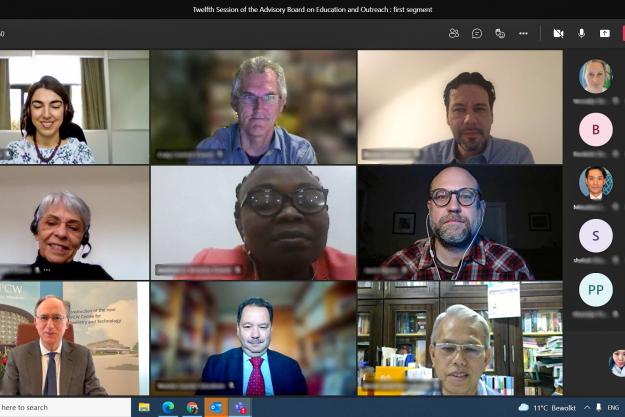
THE HAGUE, Netherlands—16 February 2022—The Director-General of the Organisation for the Prohibition of Chemical Weapons (OPCW), Ambassador Fernando Arias, welcomed 11 new members to the Advisory Board on Education and Outreach (ABEO) at its 12th session held online from 8 to 10 February.
The Director-General highlighted the Board’s geographically diverse and gender-balanced membership and noted that the wide variety of expertise and backgrounds will benefit its work. He also expressed his gratitude to outgoing Chairperson Dr Hans Georg Weinig for his able leadership of the Board in 2021.
The Board elected a new Chairperson, Mr Shahab Ud Din of Pakistan, and Vice-Chairperson, Prof. Dr Graciela Alicia González of Argentina, to lead the work of the Board in 2022.
The Director-General underlined that the OPCW Centre for Chemistry and Technology, scheduled to become operational in 2023, “will continue to be a major priority for the OPCW” and “will greatly support, among other activities, [OPCW’s] education and outreach efforts”. The Director-General reflected on the Board’s key role in raising awareness of the OPCW and its mission among academia, civil society, and the next generation of chemistry professionals. In that respect, the Board’s expert advice will help the OPCW Technical Secretariat develop and disseminate education and outreach materials as well as modules for universities.
During the session, Technical Secretariat staff provided an overview of OPCW’s public outreach, online presence, and educational tools and materials about the OPCW and the Chemical Weapons Convention. Also discussed was the Board’s role in raising awareness for professional opportunities at the OPCW with a focus on the regions of Africa, Asia, Eastern Europe, and Latin America and the Caribbean.
The ABEO was also updated on the work of the Temporary Working Group (TWG) on e-Learning with a focus on the development of a content pack for universities. In 2021, at the completion of its one-year mandate, the TWG prepared a final report with recommendations on improving the OPCW’s e-Learning portfolio, which is currently undergoing internal review to guide implementation.
Background
The Advisory Board on Education and Outreach (ABEO) was established in 2015 by the Conference of the States Parties to assist the OPCW and its Member States in all aspects of education and outreach relevant to the Chemical Weapons Convention. The Board is composed of 15 independent experts in subjects including education, science communication, the chemical industry, dual/multiple-use issues related to chemistry and the life sciences, and ethics and the Chemical Weapons Convention.
In September 2020, the Director-General established a Temporary Working Group (TWG) of the ABEO on e-learning, recognising the importance of enhancing OPCW’s e-learning portfolio for various specialist and non-specialist external audiences. It comprised of 10 prominent academics with experience and knowledge of e-learning theory and practice.
As the implementing body for the Chemical Weapons Convention, the OPCW, with its 193 Member States, oversees the global endeavour to permanently eliminate chemical weapons. Since the Convention’s entry into force in 1997, it is the most successful disarmament treaty eliminating an entire class of weapons of mass destruction.
Over 99% of all declared chemical weapon stockpiles have been destroyed under OPCW verification. For its extensive efforts in eliminating chemical weapons, the OPCW received the 2013 Nobel Peace Prize.
More Information
- OPCW Director-General’s Opening Remarks at the 12th Session of the ABEO
- Advisory Board on Education and Outreach
- Education and Outreach at OPCW
- Photos from the Event
